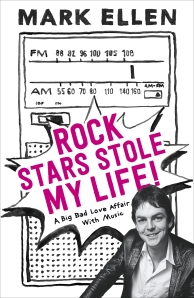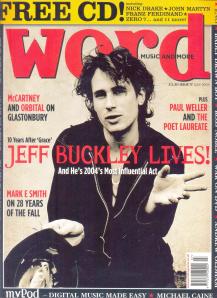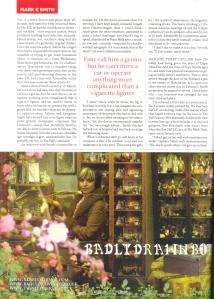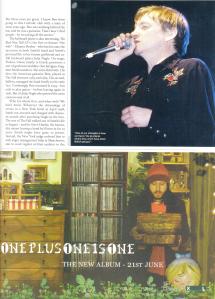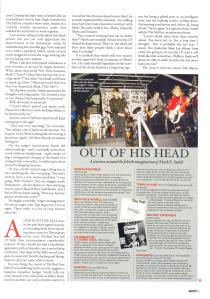I spoke to Mark on the recent promotional tour for his autobiography. After briefly bumping into him in the centre of Altrincham, as he excitedly sought out a branch of Greggs (“they don’t have these places in London!” proclaimed the indefatigable Ellen) we reconvene a little later, post-pasty.
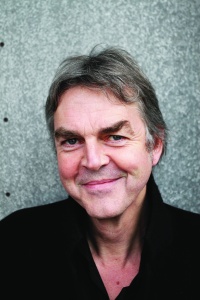
So Mark, let’s start with the beginning of ‘Word’ magazine. How did the idea come about?
David Hepworth had the original idea. I was still working at EMAP and there had been an almighty internal collapse which I allude to in my book. We just wanted to escape – and fast. Dave left and had started his own publishing company, Development Hell. He rang me up one day and said “I’m starting a project, why don’t you come and work on it with me?” For some reason I said no – I really don’t know why I did. I was involved in a whole ton of magazines that I was trying to launch at EMAP and I didn’t want to leave those projects, I wasn’t really thinking it through.
I met up with him, we had a drink and he asked if I wanted the job. I said “I don’t think I do”. He was a little crestfallen. As we walked down Tottenham Court Road we saw some out-of-work actors. They were outside Boots and, for some reason, dressed as squirrels, one of them with a giant toothbrush and the other with a big tube of toothpaste. He said “you’ve probably made the right decision. In two years’ time that’ll be me and you.” There was a third toothpaste-promoter there actually who wasn’t even dressed as a squirrel and Dave added “You’ll probably be the one without the costume!” It was really funny and quite touching.
When I told my wife she said to me “You said no?! Why would you say no to working on a project with David? Think of all the great things you’ve done together in the past!”
At that point, how long had it been since you’d last worked together?
A while actually, quite a long time, probably not since we were together at the birth of ‘Mojo’.
He had the idea for ‘Word’ and knocked it around – we didn’t even have the name at that time. We employed some people and got it going very quickly. It was very different getting it started in the shadow of these giant companies that we’d just left. We realised very soon that it was going to be quite tough; we were the little corner shop and they were the massive supermarkets with a lot of clout. But it was a wonderful time and we felt very enthralled about trying to do something that was completely the opposite of what EMAP had become – over-researched, cold and corporate. We just wanted to get back to doing a fanzine.
There was a brilliant moment when we did some interviews to launch it and a young journalist from ‘The Independent’ came down to a local café. She just couldn’t understand what it was all about. She asked, “What is this? Is it just a magazine for boring old farts?” I thought, “Oh my God, this is going to be the headline! This is our one big shot and it’s going to say ‘Boring Old Farts Re-united’ and make it sound like it’s going to filled with dreadful old drivel about prog-rock”. I persuaded her to come back to the office and have a look around. First of all the lift didn’t work properly. The key had broken off so I was fumbling around for loose change because you had to put a tupenny bit into the keyhole. She soon realised that the building, this funny old lock-up in Islington, was completely knackered. Before I took her into the Word office I pointed out of the window and told her “That’s my old place”. It was a chrome and glass edifice on Shaftesbury Avenue and the office was up on the 8th floor with a panoramic view of London. Then we went into our office and there were mousetraps everywhere, broken pipes and a smashed window patched up with gaffer tape – it absolutely melted her heart. Though she didn’t understand what we were doing, she understood our enthusiasm, it was very touching. She wrote a piece saying these guys really believe in what they’re doing, they’re the Davids that are taking on the Goliaths with their slingshots. The ‘boring old farts’ angle went straight in the bin! That got us off on the right foot and people realised we were just going back to what we loved the most.
As a reader, it felt like the magazine established its rhythm very quickly. Did it feel like that for you?
Yes, I suppose so, though it changed a lot in its structure over the years. We started with a front section, filled with short stories which was based on ‘The New Yorker’ and their ‘Talk Of The Town’ section. We all loved ‘Talk Of The Town’ a lot, very sharp and well-edited stories that had been expanded into mini-features. We returned to that again later on. We soon abandoned ‘Ellen’s Folly’ as it became known, the barn-door flap on the first three covers that started to curl up like a British Rail sandwich after a few minutes on the stands.
So, yes, I think it got a rhythm quite quickly and we had quite an interesting way of looking at the world. Your job as an editor is to decide which 35 or 40 stories or subjects you’re going to include, that’s the first part of the process. The second is to find the single most interesting aspects of those stories that you can build your observation around, and the third is to find the right person to write it and the best way and most alluring way to express it graphically. So it goes through an enormously super-charged process of scrutiny in order to finish up in a magazine like ‘Word’ – which you don’t often find on the average blog. We didn’t write very much negative stuff, we left that to other magazines. We didn’t see the point really: there’s so much to be enthusiastic about.
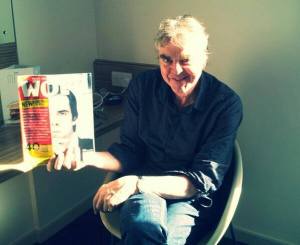
Mark with the first issue of Word magazine, ‘Ellen’s folly’ still intact.
One thing that really set the magazine apart from similar titles was the community that grew up around it. Was it a conscious choice to develop it or did it just happen organically?
I didn’t know much about the relationship between print editorial and the internet, I’m not sure many people did in those days. The actual idea was you publish the magazines every month, feed some of the ideas into the website, hope some conversation will evolve and that that’ll percolate back into the magazine. That’s my very naïve view of it but I’m a very analogue person.
You don’t even tweet do you?
No, I don’t – I’m absolutely hopeless! I have people who tweet for me. Sometimes I send a message to Dave and I look at his twitter feed and he’s put it up himself – which is fair enough!
But the website just suddenly took off. I remember it was an extraordinary moment when they had the first Massive [the name given to Word’s community of readers] Mingle in a pub in Islington. Fraser Lewry, our digital editor, saw it on the forum and said “Have you seen what’s going on? These people are all actually going to meet up and have a pint.” We wondered if we could tag along. Were they having a party and didn’t really want us there? Somebody, Fraser I think, dropped a hint and kind of asked if it would be alright for us to go too. What I remember is the fact that the only people most of them recognised in the pub were me and Dave. Everyone else was coming in with rolled up copies of ‘Word’ with just the ‘WO’ of the logo showing – it was like something out of a Russian spy movie or a Masonic meeting! I went to two or three of them and they were great fun. You know when you go to a party and you’re trying to find your kind of people? There’s some people going on about Manchester United over there and someone over there is talking about the stock market or some old bollocks and eventually you see someone in a Grateful Dead T-shirt…
Or an Incredible String Band badge…
The Incredible String Band! Oh my lord yes, I’d be round them like a wet towel! You’ve found your little gang of kindred spirits! That’s how I felt going to the meet ups. They were *your* kind of people.
There was a similar feel to the podcasts in that they were quite unlike radio. Radio, unless it’s a late-night programme, is very pressurised. “The time now is 10 to 6 and here’s a newsflash, or the traffic or the weather …” It was Dave’s idea to start them by fading in on a conversation so it was like an endless dialogue you were eavesdropping on. We would start by saying things like “…so Keith, Anita and Brian are in a Bentley driving through Marrakesh in ‘68…” and the audience would immediately understand what you were talking about. If you read The Observer, say, and they’re writing about Bowie, they’re duty-bound to give all the background about him for people on the fringes – like who Ziggy Stardust was and his plastic soul period etc; “He’s been through some ch-ch-changes!” – but we all *know* this and are thinking, let’s get the party started! The great thing about the Word Massive is that the party’s already started. Everyone’s ready to go. They’re not bored by what people are saying and they’re very good-natured about chiding you for your personal tastes in music. When I worked at the NME it was a sackable offence to like Blue Oyster Cult, the Incredible String Band or jazz but I like all kinds of stuff. There was an electro-funk faction who thought the reggae faction were ludicrous. The Mancunian funk lot kept themselves to themselves in the corner playing A Certain Ratio and Crispy Ambulance records and there was no dialogue between any of them.
Another nice thing about the Word Massive and the magazine is it became confessional. You get to that point in life when you can apologise publicly for some of the godawful music you used to listen to – “I really don’t know what came over me!” You could be honest about what you really liked and no-one ever said they liked things just to impress other people. Everyone had some funny little favourites: Rob Fitzpatrick would go on and on about Rush, Fraser would talk about Faster Pussycat and Kate Mossman would quack on about Queen. Everyone’s got their ‘terrible secret’ – we all have – and it’s really funny when you get far enough away from it.
It’s a couple of years now since the magazine folded. What are your abiding memories? Are there any highlights or favourite articles that stand out?
Millions, lots of funny ones. I remember a great Glastonbury map that Andrew Harrison and I put together. Dave wrote an amazing piece about 100 years of The Blues in Issue 11, the greatest piece ever published in Word which starts with him travelling down to Memphis in 1977 with Alex Chilton: wonderful! Harrison on the iPod in Issue 3. Kate’s piece about her obsession with Queen when she was 11. Paul Du Noyer meeting Amy Winehouse. I guess pieces that were interesting for me to set up were things like the Pete Doherty article when Sylvia Patterson went down to a crack den in Shoreditch. And I once got a load of kids to review a Bob Dylan album which was fascinating. The gag pieces were often written – or co-written – by me and were a lot of fun. A lot of magazines, ‘Word’ included, couldn’t get access to the big stars much anymore, so much of it was down to ingenuity. Necessity is the mother of invention and we had to fill this magazine. My morning commute was 16 stops to the office on the overground and I’d try and write 16 ideas, one per stop. Then I’d whittle it down to about 10, try them out in the office, end up with 4 or 5 and maybe three of those would get published. Which bits do you remember?
Well, I liked that piece about being a Queen fan by Kate Mossman too, very memorable. Also there was one by Jude Rogers about her fascination with music as a youngster. I loved those personal stories. And there was that great interview of John Peel in the first issue. What do you remember about that?
It was very interesting. We were up at three in the morning in his kitchen in Stowmarket, drinking and playing singles after he’d done one of his Radio One shows from his home studio. Lonnie Donegan had died a few days before and he’d been to visit him. It was very moving. Peel was one of the people who had really got me into music and for him the equivalent was Lonnie Donegan, who had been the spark that lit the blue touch paper. I remember the tears pouring down his face as the two of us sat there listening to Donegan singing ‘Frankie And Johnny’.
Funnily enough, rather like you, I enjoy those three dimensional soulful pieces. If it’s not too immodest I enjoyed a piece I wrote about rock stars’ WAGs. Nine and a half thousand words trying to produce a three-dimensional picture of what it would be like to be in a relationship with a rock star, to be the wife or husband. It made me feel that the magazine had a good understanding of the predicament of rock stars. Most magazines tend to look at things in a very rock critic way – (adopts rock critic voice) “the third sophomore second album was less underwhelming than the classic fourth long-player…” – but that’s not how life really is. You’ve got to get into the mind-set of the person who actually made that album, try to understand its emotional backdrop. That gives you the real insight into what the music is about and increases your enjoyment of it. I think we were quite good at doing that, of getting round the back of the picture and figuring out how it works.
In terms of your career in print, radio and television, where does ‘Word’ sit? Do you have a particular fondness for it compared to some of the other projects you’ve worked on?
Yes I have – but it’s difficult not to sound like someone discussing which of their children is their favourite. I was attached to all of them… but ‘Word’ was amazing, an incredibly noble venture and I’m so pleased we did it. After the ‘Dead As A Dido’ issue [the infamous issue featuring Dido as cover star which sold poorly and in Ellen-speak was “nailed – and glued – to the shelves”] I thought we might be doomed and I’m really proud that we kept going. In the book I describe the front cover of The Pogues ‘Rum, Sodomy And The Lash’. I felt that was us, these tattered souls with great ships coasting past us, the Uncuts and Mojos, but there we were, these courageous souls battling with the elements. I’m very proud of it. I think there were a lot of very interesting ideas. I flicked through a few back issues to remind myself when writing the book and actually thought it was pretty funny too. We worked really hard at keeping the beach-ball of entertainment off the ground. Also they were a great team and I have really fond memories of all the gang. For the last three years or so it was just Kate and me really, the others came in part-time to help with production. She and I sat there inventing this stuff, pulling it all together, and having such a laugh in the process. We have exactly the same musical taste. It was just Queen we couldn’t agree on.
It was a great adventure, really original and I think it gave a huge amount of pleasure to other people who could sense the enjoyment we were getting out of it. The other good thing was that it wasn’t just a magazine you could read, you could hear the spirit of it being transferred to the podcast. When we closed, The Guardian wrote an obituary and said we were the only magazine with a musical contents list. Kate, Fraser and I used to do a monthly videocast and there was one where she’s just turning the pages of the magazine silently and I’m playing ‘Singing In The Rain’ on the guitar – it was psychedelic, bonkers, bizarre. We did whatever and that’s the way it should be. A lot of magazines are produced in a blind panic, playing safe with no spirit of adventure or creativity. The Word was not one of them. And nor was Q or MOJO or Smash Hits or Select.
Are there any magazines you subscribe to now?
I get ‘New Yorker’, ‘Private Eye’ and some diving magazines. I read ‘Vanity Fair’ quite a bit but I’m not sure about the other music papers, I don’t think they’re for me. I thought ‘Word’ was for me and although I’m fond of some of the other ones they don’t seem to be aimed at someone who looks at the world the way I do. I find some of their articles a bit difficult, ones that start, “It was on an otherwise uneventful afternoon in Los Angeles when Stills turned to Young and Young turned to Crosby and Crosby turned to Nash and said ‘Let’s form a group!” Oi, you weren’t even born, mate, you weren’t there! I felt it was our job to do a bit of spade work and actually bring these stories on and employ people who were actually around at the time. Dave and I in particular were old enough to have been there and met some of these people a long time ago. The other thing is that they’re very compartmentalised. If you like Kraftwerk – great, there’s a 20 page article about them. If you like XTC – there’s a 15 page special on XTC as a well as a definitive piece about The Klaxons. That’s great if you like them but I don’t know if the actual magazines themselves are fully-unified pieces of entertainment. With ‘Word’ I felt – rightly or wrongly – that even if you didn’t like any of the subject matter in our magazine you’d still get a lot of fun out of it: it was an entertainment in itself.
I think you’re right, the quality of the writing was high and it was engaging. It was the enthusiasm and love of the subject matter that pulled people in.
I like to think so, that was the spirit of it. I mean, I’m not really a rock critic. The editor and the critic are two different animals. I can write rock criticism but my main problem is that I only have 2 opinions: things are either ‘brilliant’ or ‘so-so but we’ll give it another chance and see if it improves’. That’s no good for a rock critic, you have to shoot from the hip – “This is gibberish! These terrible dinosaurs must be shot down, they’re committing crimes against *humanity*!” My feeling is that it’s just pop music, don’t take it too seriously. Then again a lot of it was about plumbing the souls of the people who wrote the songs. There’s an interview I did with Leonard Cohen [in Issue 53] where he talks about the power of music. He says “It stops the mind from spinning. Because we’re all over the place. A good song, a good lyric, is a movie: it will just focus and calm and confer significance on this completely bewildering reality that all of us live in.” Wonderful! I asked him what his favourite lyric was and he said “I found my thrill on Blueberry Hill”. I thought that was marvellous – you go to this specific geographical location and don’t even know what the thrill is but you find it! Your imagination fills in the gaps. That’s largely what music is all about, getting your senses ignited by being transported somewhere more wonderful than the real world.
—
Mark Ellen’s memoir ‘Rock Stars Stole My Life!’ is available in hardback, eBook and audio formats and published by Hodder & Stoughton and includes fond memories of Word’s magazine and podcasts.
